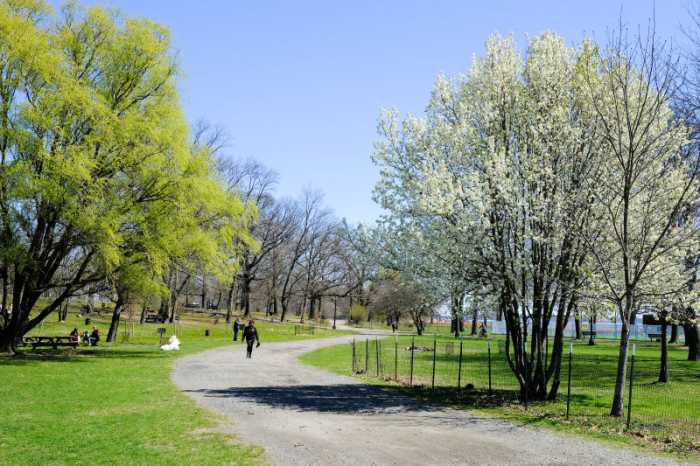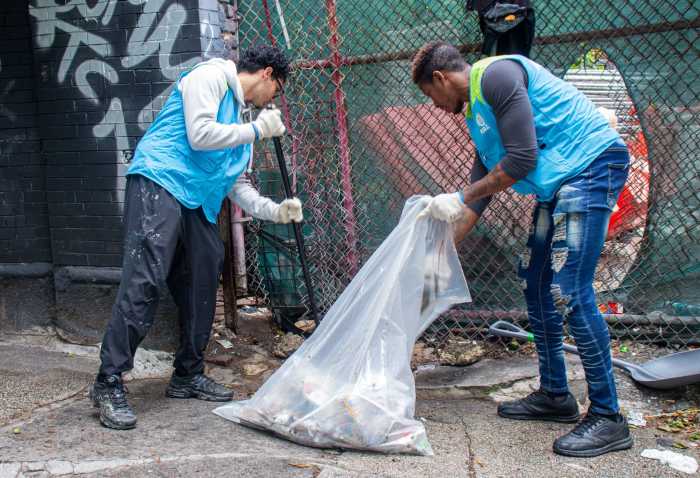Environmental advocates and local elected officials are sounding the alarm about a proposed expansion of a gas pipeline, which they say would increase the state’s dependence on fossil fuels and increase greenhouse gas emissions in Hunts Point.
If approved, the expansion — proposed by the Iroquois Pipeline Company — “would be completely undermining” the state’s climate goals, said Emily Skydel, senior NYC organizer for the nonprofit advocacy group Food and Water Watch.
Officially called the Iroquois Company Enhancement by Compression (ExC) project, the expansion would add new compressor stations along its 414-mile route — two in the Hudson Valley region and two in Connecticut — allowing more gas to be pumped into New York via two of its utility customers, National Grid and Con Edison, which has a station in Hunts Point. If approved, the project is expected to be in service by January 2027.
But before then, federal permits along with two air permits from New York’s Department of Environmental Conservation (DEC) are required for construction — meaning the project cannot proceed without signoff from the state.
Environmental advocates, along with dozens of elected officials, have undertaken monthslong efforts to block the state permits. A December 2023 letter to Gov. Kathy Hochul imploring her to ensure the permits are denied was signed by over 60 lawmakers from across the state and New York City officials, including Bronx state senators Gustavo Rivera and Nathalia Fernandez.
If the expansion goes ahead, it would “put New Yorkers at great risk and run fully astray of our state’s climate goals,” according to the letter. “Continued investments in fossil fuels perpetuate our dependence on a dirty energy future.”
The state is currently reviewing the permit applications and should issue a decision soon, Iroquois Pipeline representatives told the Bronx Times.
Hunts Point pollution
While the precise effects of the expansion on Hunts Point are unclear — and the new compressors are not located in the city — Skydel, citing a 2021 report by Food and Water Watch, said people living near gas infrastructure are at risk of damage from potential explosions, plus increased risk of health problems caused by pollution, including respiratory illnesses and some cancers. And city data shows that Hunts Point already has worse air quality than other neighborhoods in virtually every measured category.
But the proposed expansion would not bring any new construction to Hunts Point and would simply increase the amount of gas delivered to Con Edison using the same mechanisms in place since 2003, according to Iroquois representatives.
The company said it is taking steps to control potential harmful effects of the expansion. A brochure on the Iroquois website says the project is subject to “extensive environmental review” and that it plans to install systems to trap methane, among other measures.
But advocates are not reassured — or even in agreement that the expansion is necessary. Skydel argued that gas demand in New York is on its way down, thanks to the state’s 2019 Climate Act and New York City’s Local Law 97, both of which are aimed at drastically reducing gas emissions.
“This gas isn’t needed,” she said, adding that the Iroquois Company is “misleading” the public about the need for expansion.
But spokespersons for the Iroquois Pipeline Company told the Bronx Times that demand for gas is indeed still high — and the state agency responsible for making that determination agreed that the expansion is necessary.
The state’s Department of Public Service (DPS) ruled in February— as part of the approval process—that although the project would increase greenhouse gas emissions, the expansion is justified and “necessary to ensure Con Edison’s and National Grid’s continued provision of safe, adequate, and reliable gas service to customers in the downstate region.”
Despite the ruling, Skydel said she remains optimistic about the chances of defeating the pipeline expansion. She pointed to past wins, such as last year’s denial of the same types of permits in North Brooklyn for a proposed National Grid project, as a sign that momentum is shifting away from investment in gas.
“The truth is on our side,” said Skydel.
Both the state and Iroquois Pipeline Company say there have been multiple opportunities for public information and input. The public comment period ends April 29. Residents can submit input to DEPEnergy@dec.ny.gov
Reach Emily Swanson at eswanson@schnepsmedia.com or (646) 717-0015. For more coverage, follow us on Twitter, Facebook and Instagram @bronxtimes
























